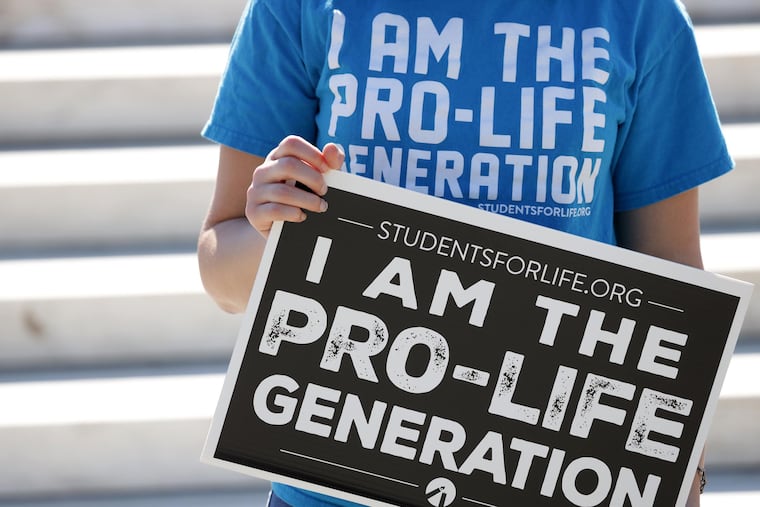Once Roe is reversed, Pennsylvanians must elect a governor who will abolish abortion
More steps are needed to fully undo a deadly distortion of the Constitution and have every child welcomed in life and protected by law, writes Michael J. McMonagle.

As the president of the Pro-Life Coalition of Pennsylvania, I felt a deep sense of gratitude and fortitude when I heard about Roe v. Wade’s likely reversal. The ringing of church bells should herald this joyous development. The court’s decision would reverse an egregious and deadly distortion of our nation’s Constitution and significantly enable our mission to have every child in Pennsylvania welcomed in life and protected by law. Nevertheless, the Pennsylvania pro-life movement still faces significant challenges to achieve the full lifesaving impact of this reversal.
Pennsylvania’s pro-life movement expresses our gratitude to the many religious, medical, and political leaders who have gone before us, such as John Stanton, one of the founders of the Pennsylvania pro-life movement and my mentor. Most importantly, we thank the multitude of faithful participants in our movement whose prayers, advocacy, and charity are primarily responsible for this development. Now, we need to courageously and zealously increase our efforts to seize the opportunities of Roe’s reversal.
That begins with the election of pro-life Pennsylvania governor in 2022. The only Democratic candidate, Josh Shapiro, supports the Women’s Health Protection Act, which would legalize abortion and eliminate Pennsylvania’s informed and parental consent laws for those under 18.
All the Republican candidates for governor assert a pro-life position, but some significant differences exist between them, which are explained on our website.
Another challenge is the current case before the state Supreme Court, brought by the operators of 16 Pennsylvania abortion facilities, that essentially asks the court to invent a “right to abortion” in the Pennsylvania Constitution so that providers can be paid by state Medicaid funds for killing the unborn children of the poor. In addition to its deadly brazenness, this lawsuit demonstrates the hypocrisy of the pro-abortion position regarding “stare decisis.”
» READ MORE: Leaked Supreme Court draft ruling on Roe v. Wade: What you need to know
Because the U.S. Constitution contains no “right to abortion,” the pro-abortion legal argument to keeping Roe has been stare decisis, i.e., let the prior decision stand. In 1985, in Fischer v. Department of Public Welfare, the Pennsylvania Supreme Court ruled 6-1 that the “right to abortion” does not exist in the Pennsylvania Constitution. But these abortion plaintiffs are claiming that the Pennsylvania Constitution has “evolved” and that such a right now exists.
Despite the Fischer precedent, and given the current 5-2 Democratic majority on the state court, our movement has realistic concerns that this court could invent such a right. Thus, we are acting to pass, in 2022, an amendment to the Pennsylvania Constitution that clearly establishes that no “right to abortion” exists; the amendment would likely be considered in a November 2023 statewide referendum.
Another challenge is countering the continuous misrepresentations regarding the abortion issue. One glaring example is the misrepresentations about the extent of Roe.
Roe created a de facto “constitutional right” to abortion. In Roe’s companion case, Doe v. Bolton, the Supreme Court defined “health” so broadly as to include any reason.
The Pennsylvania Department of Health reports that nearly 90% of all abortions continue to be committed on unmarried women. Our movement has been responding to this challenge of sexual promiscuity by developing and empowering zealous young adult chastity educators, such as with Generation Life and The Culture Project, who proclaim the truth about the source of human dignity — that human beings are created, as male and female, in the image of our Triune God.
There is also the stale pro-abortion accusation that the pro-life movement only cares about children until birth. This charge fails on premise and fact. Of course, we focus our extensive local network of services on saving children before birth because post-birth services become moot if children do not survive the womb.
» READ MORE: Calling on lawmakers to reduce the number of abortions in Pennsylvania | Opinion
Our movement does have a recently developed asset in meeting these challenges. The pro-abortion movement’s slogan — “My Body, My Choice” — has lost credibility because most pro-abortion public officials have mandated, as a condition of employment, COVID-19 vaccines.
Roe’s reversal means that voters in Pennsylvania will get to choose between two competing ethics in the November election for governor and what we expect will be a November 2023 statewide referendum against court-ordered taxpayer funding of abortion. One ethic derives from our nation’s Declaration of Independence, which declared that all human beings are created (not born) with a God-given right to life. The other ethic comes from the justification for slavery, which is the legal and moral acceptability of treating one human being as the property of another human being.
Please join us in late June or early July, after Roe’s official reversal, near Independence Hall as we celebrate and proclaim this fundamental principle of our nation’s Declaration of Independence.
Michael J. McMonagle is the president of the Pro-Life Coalition of Pennsylvania. paprolifecoalition@gmail.com